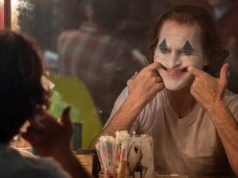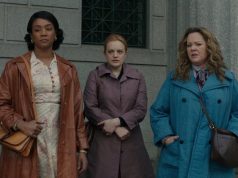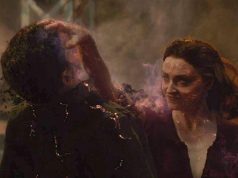We’ve always known in the back of our minds that there was a science-fiction angle to the Superman saga — he’s an extra-terrestrial, after all — but none of the big-screen versions have emphasized it. Until now. “Man of Steel” starts with a rousing action sequence on the doomed planet Krypton, giving us a detailed view of Kryptonian technology and animal life, and then delivers a plot driven by “world engines,” alien invasions, singularities, terraforming, and the basic questions about what it means to be human.
It does all of this while presenting Superman’s origin story, though with a slightly different spin from what we’ve seen before (at least in the movies). Directed by Zack Snyder (“300,” “Watchmen”) and written by David S. Goyer — who’s an old pro at this sort of thing (“Batman Begins,” “Blade”) — “Man of Steel” sends brooding, bearded Clark Kent (Henry Cavill) on a journey of personal discovery before he dons the cape and tights, and even before he adopts the dorky, bespectacled “mild-mannered reporter” persona. There’s no need for a secret identity at first, because he’s just a guy named Clark Kent who happens to have alien DNA and extraordinary powers. There is no “Superman” yet.
Flashbacks to Clark’s youth show key moments in his development while letting the present story progress. His adoptive parents (played with tenderness by Diane Lane and Kevin Costner) are protective, with Pa Kent in particular concerned about what will happen to Clark when the world learns his secrets. We humans do tend to react with fear and alarm to unfamiliar things, and the Kents’ worries are confirmed when some of Clark’s heroic deeds become publicly known. A certain newspaper reporter named Lois Lane (a feisty Amy Adams) happens to get involved, too.
Clark, his powers, and his heritage are drawn out into the open with the arrival of General Zod (Michael Shannon), a Kryptonian psycho who’s been searching the universe for an important piece of technology that could rebuild the Kryptonian race and may have been sent to Earth with baby Kal-El. Zod and his crew, imbued with powers like Superman, are a good match for him, and for the U.S. military, the leaders of which aren’t sure whether ANY of these aliens, Clark Kent included, are trustworthy.
“Man of Steel” (2013) B-
“Batman v Superman: Dawn of Justice” (2016) C-
“Suicide Squad” (2017) D
“Wonder Woman” (2017) B+
For a while — probably two-thirds of the running time — the film is grandly entertaining. Cavill makes a fine Superman, physically speaking (he’s brawny and hairy-chested, not to mention lantern-jawed), and he has the right blend of stoicism and basic decency. A few moments between young Clark (played by Dylan Sprayberry) and his Earth dad are sublimely touching. (His biological father, played by Russell Crowe, is also present, in convenient holographic form, to give paternal guidance.) Michael Shannon and Antje Traue are appropriately menacing as Zod and his right-hand butt-kicker, Faora-Ul, and Snyder captures the sheer terrifying speed with which these super-characters can move when they’re fighting. Though different in tone from the more colorful and humorous Superman films of yesteryear, and though I miss Jimmy Olsen and bumbling Clark Kent and John Williams’ iconic musical score, Snyder and his team make the new, grittier formula work.
But then, as we get into the climactic battles, the level of wanton destruction becomes excessive, even tacky. The apocalyptic damage visited upon Smallville and Metropolis is treated as though it has no consequences. I’m accustomed to filmmakers viewing mayhem that way — but it’s troubling that Superman doesn’t seem to care. Superman is supposed to do everything he can to protect people, even when he’s got his hands full with enemies. He could draw his opponents away; instead he fights them on Smallville’s Main Street, leveling it like a tornado, and then in downtown Metropolis, knocking over one skyscraper after another, seemingly oblivious to the devastating collateral damage. Not only is that a betrayal of the character’s ideals, it’s a tired way to end a movie.
B- (2 hrs., 23 min.; )





